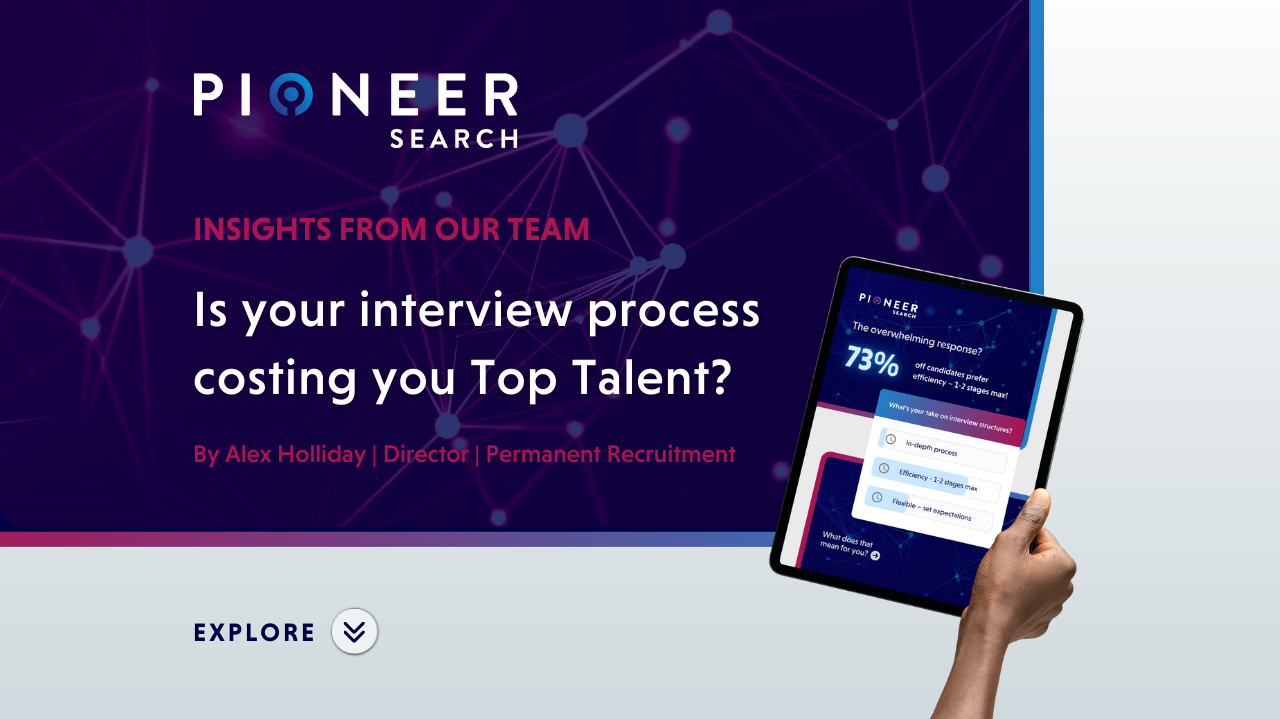Is your interview process costing you Top Talent?
By Alex Holliday, Director of Permanent Recruitment at Pioneer Search
Over the past month, I’ve run a series of LinkedIn polls to understand how candidates really feel about interview processes and the impact it's having on hiring outcomes.
The results confirmed what many of us already suspected: drawn-out, unclear hiring processes are losing businesses the candidates they want most.
------------------------------------------------------------------------
Interview fatigue is a real problem
In the first poll, we asked:
“How many interview stages are too many?”
The vast majority of candidates said 1–2 stages is ideal.
Despite this, we continue to see businesses run 4, 5, even 6-stage interview processes. While the aim is often thoroughness, the reality is delays, duplicated conversations, and a poor candidate experience.
------------------------------------------------------------------------
Candidates aren’t just frustrated - they’re walking away
In the second poll, we asked:
“Have you ever turned down a job offer because of a drawn-out process?”
51% said yes.
These are candidates who were interested, engaged, and then lost confidence somewhere along the way. In a market where talent has options, businesses simply can’t afford that kind of drop-off.
------------------------------------------------------------------------
The real issue? Communication and clarity
In our latest poll, we went further:
“What’s the most frustrating part of a long interview process?”
Here’s what candidates told us:
- 48% said too many stages
- 42% said slow feedback or updates
- Only 6% said repeating information
- Just 3% said unclear process
It’s not just about length - it’s about how the process is handled.
------------------------------------------------------------------------
What should hiring managers be doing?
Your interview process reflects your business. It tells candidates what kind of environment they’re stepping into - structured, respectful, decisive… or the opposite.
Here’s where to start:
- Simplify the structure: Streamline your process. Avoid unnecessary steps. If multiple stakeholders need to meet a candidate, consider a joint panel or back-to-back interviews.
- Communicate clearly: Set expectations. Let candidates know how many stages there are, who they’ll meet, and when they’ll hear back. A short update is better than silence.
- Move faster: Great candidates don’t hang around. If you delay, you’re likely to lose out - not because the offer isn’t right, but because the experience wasn’t strong enough.
------------------------------------------------------------------------
A note to candidates
Don’t be afraid to ask for transparency. You’re entitled to know how long a process will take, what the steps are, and when you can expect feedback. If that clarity isn’t there from the start, it says a lot.
------------------------------------------------------------------------
An inefficient interview process doesn’t just slow things down - it turns great people off. It damages your employer brand and impacts your ability to hire the people your business really needs.
The companies getting this right are moving quickly, making decisions with confidence, and putting people at the centre of the process.
If your process isn’t securing the right talent, or you’re seeing drop-off before offer stage, it’s time for a rethink. Get in touch today to discuss further:
Tel: 0203 838 6963
Email: alexh@pioneer-search.com



